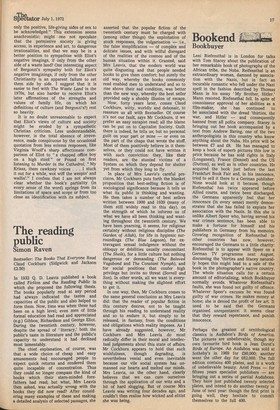Bookend
Bookbuyer
Leni Riefensthal is in London for talks with Tom Stacey about the publication of her remarkable book of photographs of the African tribe, the Nuba. Reifensthal is an extraordinary woman, damned by association with the Nazis, but in fact an incurable romantic who fell under the Nazi spell in the fashion described by Thomas Mann in his essay 'My Brother, Hitler.' Mann resisted, Riefensthal fell. In spite of connoisseur approval of her abilities as a film-maker, she has continued to be associated with the dread 'thirties, the war, and Hitler — and consequently banned from all polite company. Stacey is bringing out her book accompanied by a text from Andrew Baring, one of the two anthropologists in this country who know anything about the Nuba. His price will be between £7 and £8. He has managed to keep a book of superb pictures this low in price because he has sold rights in Italy (Longanesi), France (Denoel) and the US (Dutton), as well as in other countries. He acquired the book just before the last Frankfurt Book Fair and, in his innocence, tried to sell it there to a German publisher. None would look at it because, though Riefensthal has twice appeared before Allied courts, and twice been discharged, the Germans apparently feel that her innocence (in every sense) merely demonstrates that she has failed to expiate her association with the Nazis. In this she is unlike Albert Speer who, having served his war crimes sentence, has been able to make a fortune for himself and his publishers in Germany from his memoirs. Growing recognition of Riefensthal in other countries has now, however, encouraged the Germans to a little charity: Riefensthal is to appear with Speer on a German TV programme next August, discussing the 'thirties and Stacey naturally hopes this might lead to a sale of the book in the photographer's native country. The whole situation calls for a certain amount of editorialising, which Bookbuyer normally avoids. Whatever Riefensthal's faults, she was found not guilty of offence. Whatever Speer's excuses he was found guilty of war crimes. He makes money at home; she is denied the profit of her art. It used to be said that the Germans organised unrepentance: it seems clear that they reward repentance, and punish innocence.
Perhaps the greatest of ornithological classics is Audubon's Birds of America. The pictures are unbelievable, though my own favourite bird book is Jean Dorst's Birds of Europe. An Audubon was sold at Sotheby's in 1969 for £90,000; another went the other day for £62,000. The full edition contains 400 plates, and is a work of unbelievable beauty. Ariel Press — for fifteen years specialist publishers — are bringing out a series of partial Audubons. They have just published twenty selected plates, and intend to do another twenty in June of next year: though the first print is going well, they hesitate to commit themselves to the full 400.






















































 Previous page
Previous page